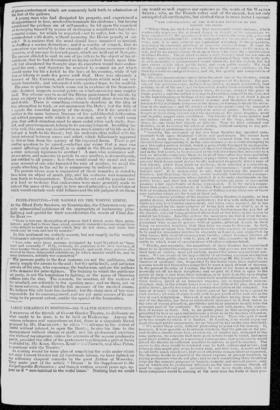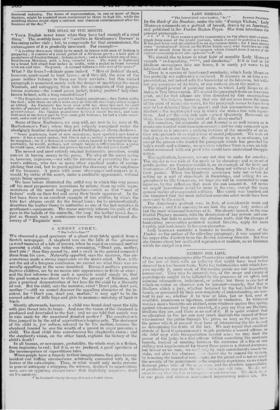LARGE THEATRES IN DISTRESS — SIR WALTER SCOTT'S OPINION.
A MEETING of the friends of Covent Garden Theatre, to deliberate on what ought to be done, is to be held on Wedresday. Among the various schemes and suggestions on foot, there is- a singularly liberal proposal by Mr. MACREADY : he Offers "to advance to the extent of 10001, without interest, to open the theatre, to give his time to the management without charge or profit, and his professional exertions also without recompence, sinless the accounts of the season produced a profit, provided the offer of the performers to relinquish a part of theirs be abided by. Mr. Kean, Messrs. Kembie maul Fawcett, and Miss Paton, to continue with the Theatre."
In casting round for some plan of remedying the evils under which not only Covent Garden but all theatricals labour, we have lighted on the following eloquent remarks by the great Author of Waverley. They make part of the article " Drama" in the Supplement to the Encyclopadia Britannica ; and though written several years ago, ap- Pear as if " new-hatched to the woful times." Nothing that we could
say would so well express our opinions as the words of Sir WALTER SCOTT ; W110, as the French writer said of the ancient, has not only anticipated all our thoughts, but clothed them in moeis better language.
" BAD CONSEQUENCES OF THE St ■Nk■DaLli By THE LONDON TIIL.VID LS.
" Where then, aro eve to look for that unfortunate emint,,;-balont,,, which confes,eilly the used drailia in id( aiivaiii,r4e,.; we
have \\'e eh, it wiii he Chin,' in the by two large establishweht-i. the pi bat
magi, it is said, without losy equivalent zuivantaae to the proptietots, Noy enjoy the exclusive iirivihsee ofshamatic repo:sent:own. It ilite,t he we attribIlle these disanvatilae,; Sy,/0m A-
scii', and by no means charge theta those vim have the witniniskation of either theatre. The prapritts os hose a rush` to enjoy what the iaw invests in them ; and the managers have probably discbarqed their duty to the pub-
lic as Ito-foolishly as circumstances would admit. ; but the system has led into errors which affect public taste, and even public morals. We shall
briefly consider it os it influences, 1st, the mode of representation ; the theatrical authors and performers; and 3d, the quality and composition of the audience.
" The first inconvenience arises from the great size of the theatres, which
has rendered them unfit for the leen host c purposes of the drama. The per- sons of the performers arc, in these huge circles, so much diminished, that nothing short of the mask and buskin could render them distinctly visible to the audience. Show and machinery have, theteiOre' usurped the place of tragic poetry ; and the author is counselled to suhlress himself to the eyes, not to the understanding or feelings of the spectators. T his is of itself a gross " error. Every thing beyond correct costume and theatrical decorum, is foreign to the legitimate purposes of the drama, as tending to divide the atten- tion of the audieliCV ; limn, the rivalry of the seenespainter and the carpenter cannot be very flattering to any author or actor of genius. Besides, all at- tempts at decoration, beyond what the decorum of the piece requires, must end in paltry puppet-show exhibition. The talents of the scene-painter and mechanist cannot, owing to the very nature of the stage, make battles, sieges, &c. any thing but objects of ridicule. Thus we have enlarged our
theatres, so as to destroy the effect of acting, without carrying to any per- fection that of pantomime and dumb show.
" The monopoly of the two large theatres has operated unfa- vourably both upon theatrical writers and performers. The former have been, in many instances, if not absolutely excluded from the scene, yet deterred from approaching it, in the same manner as men avoid attempting to pass through a narrow wicket, which is perpetually thronged by an importu- nate crowd. Allowing tile managers of these two theatres, judging in the first and in the last resort, to he possessed of the NU discrimination necessary to a task so difficult—supposing than to he at all times alike free from partiality and from prejudice—still the number of plays thrust upon their hands must prevent their doing equal justice to all ; and must frequently deter a man of real talents, either from pride or modesty, from entering- a competition, clogged with delay, solicitation, and other circumstances baud subeunda ingenio sue.' It is unnecessary to add, that increasing- the number of theatres, and dimishing their size, would naturally tend to excite a compe- tition among the managers, whose interest it is to snake experiments on the public taste; and that this would infallibly secure ally piece of reasonable promise a fair opportunity of being represented. It is by such a compe- tition that genius is discovered ; it is thus that horticulturists raise whole beds of common flowers, for the chance of finding ainong them one of those rare varieties which are the boast of their art.
" The exclusive privilege of the regular London theatres is equally, or in a greater degree, detrimental to the performer ; for it is pith difficulty that he lights his way to a London engagement, and when once reccised, he is too often retained for the mere purpose of being laid aside or shflaisa as it is technically called,—rendered, that is, a weekly burden upon the pay-list of the theatre, without being produced above four or five times in the season to exhibit his talents. Into this system the managers arc forced from the ne- cessity of their situation, which compels them to enlist in their service every performer who seems to possess hods of genius, although it ends in their being so crowded together, that they have no room to blossom. In fact, many a man of talent thus brought from the active exercise of a profession to be paid for remaining inactive in obscurity in London, and supported by what seems, little short of eleemosynary bounty, either becomes careless of his business or disgusted with it, turd, at any rate, stagnates in that medi- ocrity to which want of exercise alone will often condemn talenf.
" Thirdly, and especially, the magnitude of these theatres has occasioned them to be destined to company so scandalous, that persons not very nice in their taste of society, must yet exclaim against the abuse as a national nui- sance. We are aware of the impossibility of excluding a certain description of females from public places in a corrupted metr °puff; like London ; but in theatres of moderate size, frequented by the better class, these unfortunate persons would feel themselves compelled to wear a mask at least of decency. In the present theatres of London, the best part of the house is openly and avowedly set off for their reception ; and no part of it that is open to the public at large is free from their intrusion, or at least from the open display of the disgusting improprieties to which their neighbourhood gives rise. And these houses, raised at an immense expense, are so ingeniously miscon- structed, that, in the private boxes you see too little of the play, and, in the public boxes, greatly too much of a certain description of the company. No roan of delicacy would wish the female part of his family to be espused to such scenes ; no man of sense would wish to put youth of the male sex in the war of such temptation. This evil, if not altogether arising from the large size of the theatres, has been so incalculably increased by it, that, unless in the ease of strong attraction, prostitutes and their admirers usually form the principal part of the audience. We censure, and with justice, the corrup- tion of morals in Paris. But, in no public place in that metropolis is vice permitted to hear so open and audacious a front as in the theatres of London. Barefaced vice is never permitted to insult decency. Those who seek it must go to the haunts to which it is limited. In London, if we would enjoy our most classical public amusement, eve are braved by her on the very threshold.
fessional industry. The hours of representation, in one or more of these theatres, might be rendered more convenient to those in high life, while the middling classes might enjoy a rational and classical entertainment after the business of the day."



















 Previous page
Previous page